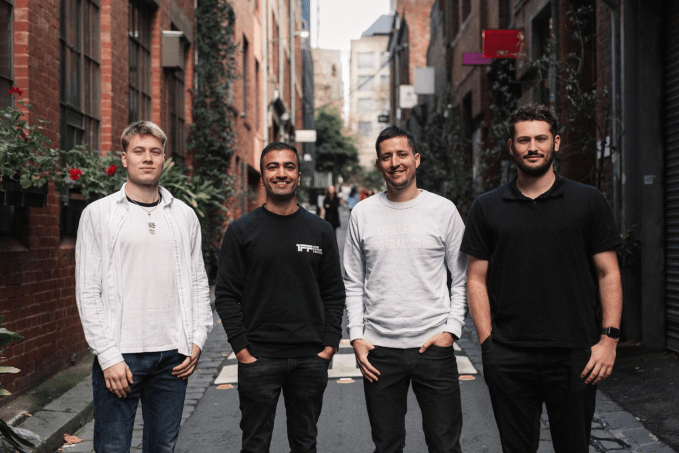Founded in Melbourne, One Future Football (1FF) bills itself as the “world’s first global soccer league,” and it’s goal is to attract first-time soccer fans. It launches today with more than 250 CGI generated players, who have backstories created so all fans have someone they can relate to (for example, there are players with diabetes and autism), and 12 founding member teams around the world.
1FF also announced today it has raised $3 million in pre-seed funding led by Blackbird Ventures, with participation from strategic investors like soccer players Chris Smalling, Patrice Evra and Jesse Lingard and UFC fighter Kamaru Usman. Tennis stars Naomi Osaka, Nick Kyriagos and Ons Jabeur will also be involved as ambassadors for the brand.
1FF’s sports code is completely virtual and consists of 12 weekly matches across two rounds, broadcast around the world with narrative-driven content. Teams play against each other in a league format. Founding member teams are located around the world, including London, Paris, Buenos Aires, Los Angeles, India, Indonesia and Japan.
Founded by serial entrepreneurs Peter Davis and Rohit Bhargava, who got to know each other while playing in the same Fantasy Premier League mini-league. Before 1FF, Davis founded LAUNCH accelerator-backed creator discovery platform Ampjar and Australian social media agency Get Glossy. Bhargava founded fashion crowdfunding platform StageLabel, was part of the AWS Startups Team and hosts The Startup Playbook podcast.
Before starting Get Glossy, Davis worked in sports, ranging from professional teams to big firms like talent management agency. “We’re both pretty big football fans, getting up at crazy times of the early morning to watch matches on the other side of the world,” Bhargava said.
Davis called Bhargava and asked him if he’d like to see the new thing he was working on, which turned out to be 1FF. One thing that piqued the co-founders’ interest in creating a global football league was a BBC article called “Why the most interesting clubs in the USA do not really exist.” It covered “faux football clubs,” or teams that created their own backstories, press releases and merchandise, but did not actually have players on the field.
“What the article laid out felt like a pretty special cultural moment. Football has become a big part of fashion and vice versa, and whether it’s what you wear to football training, to the office, or to the pub, what you wear says a lot about you,” Bhargava said. “Football clubs felt like the perfect way to shape a narrative that people want to say about themselves, because you can associate it with a geographic reason, causes like positive action in the climate sense, or even a style of play. As we delved deeper, we felt we could tap into trends around athlete investors and help build stories around each of the teams through them as well.”
To design each of 1FF’s 250 CGI players, which players’ sporting attributes were first set by one of 1FF’s engines. Then their personalities and lived experiences were inspired by different sources.

“We wanted to ensure we create a home for people that may never have connected with sport before,” Bhargava said. “You never hear of an athlete who’s into cosplay or LARPing in the park on a weekend or playing Magic the Gathering, but why shouldn’t they?”
1FF spoke with panels in each of their geographies in order to create characters that appealed to them, with background stories that include similar interests and experiences.
“We have players who have grown up very comfortably but also players who were refugees, players who are gay, players who are diabetic, anaphylactic or have been diagnosed with autism. For us, it’s about showing young people that this is for them, that they can feel safe and never ashamed of who they are.”
The geographies of the 12 founding member teams were picked to give 1FF a good representation around the world. Its players represent 88 countries, which means that even though 1FF doesn’t have a team in huge footballing countries like Mexico, Germany, Spain, Italy, Egypt, Turkey, South Korea and China yet, it does have hero players that people can follow and use as their stepping stone into 1FF.
Major League Soccer (MLS) is a big business, with Davis and Bhargava pointing to stats like Angel City valuation at $100 million despite launching only three years ago (they share some investors with 1FF), and the top 10 esports companies worth an average of $353 million, up 46% compared to December 2020.
Despite the rise of esports, Davis and Bhargava expect that their main competition will be stadium football. But 1FF’s goal is to reach fans in places like the U.S., Nigeria, India or Indonesia, who might never be able to go to a Premier League game. “Our job is to build something that resonates with them better than the Premier League, MLS, La Liga or the Bundesliga can,” Bhargava said. “This means clubs that exist for greater reasons than just to win matches, and players who look like them or have the same experiences and interests as them. We know that we an do special things with our players because they’re wholly owned by us, so we can give fans a level of control of their heres that has never been possible before.
In terms of monetization, 1FF will make money like other sporting teams, through kit sales, commercial partnerships and pitch side advertising. Some players have their own social media accounts, and brands, which 1FF will announce soon, have already signed sponsorship deals with players and teams. Some monetization channels specific to a virtual sports platform include player cards (with 10,000 available for each player) and Club Credits to give fans deeper experiences with their favorite players and clubs.
Season 1 of One Future Football starts on June 23, but before then, there will be pre-season games like matchups between Naija United (Nigeria’s team) vs Manhattan Football Club (US), Inter Nusantra (Indonesia) vs Paris St-Dennis (France) and Club De Sportivo Palermo (Argentina) vs Tokyo Youth Club (Japan).
In a statement about the funding, Blackbird partner and co-founder Niki Scevak said, “At the core of each sports fan is the desire to be an owner, to influence the decisions each club makes and to endlessly debate the merits of each small decision. Technology offers a unique opportunity to enable this at scale, and 1FF is the digital version of fantasy sports with an incredibly creative twist. As serial founders and lifelong sports fans themselves, Pete and Rohit are uniquely placed to build a modern media company like 1FF, and we’re proud to back them from the very beginning.”































Comment